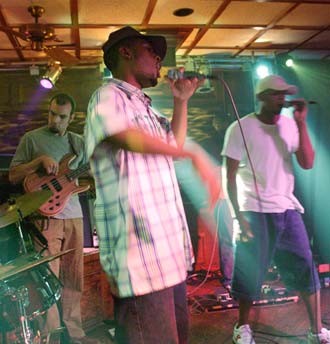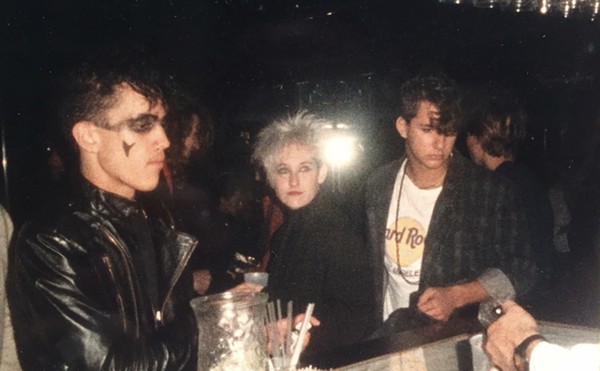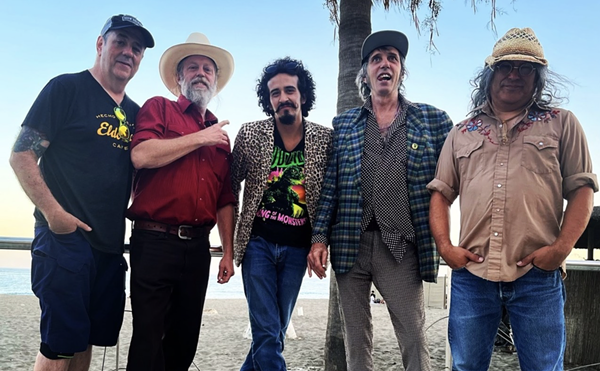| From left: Bassist Gregg Rhoades and MCs Charles Peters and Tre Scipio. Photo by Mark Greenberg |
Mojoe puts old-skool soul into their hip-hop
"Anybody in the house ever heard of a guy named Sam Cooke?"
Tre Scipio, MC for the hip-hop/R&B sextet Mojoe, is testing the soul I.Q. of his audience at Jewels Lounge. For the last three months, Mojoe has ruled Wednesday nights at Jewels like a benevolent monarchy, drawing a devoted, culturally mixed crowd for their precision-tested mix of funk, jazz, classic soul, and modern hip-hop.
It's typical of the Mojoe approach that when they tackle Cooke's '60s civil-rights anthem, "A Change Is Gonna Come," they reconstruct it from the bottom up: giving it a spare, tight groove; simplifying the chord changes; and altering the melody, with Scipio applying his appealingly raspy singing voice. It's a bit like hearing Tricky or Carl Cox remix a familiar song, and create something radically different in the process.
Their remaking of a sacrosanct Cooke standard says a lot about what makes Mojoe intriguing. They know their musical history, but they're not purists about it. In the same way that Scipio and his vocal partner, Charles (Easy Lee) Peters transorm their virtuoso backing band into more than just another slick white-funk combo, the band takes Scipio and Peters' rhymes to a level of onstage energy and soulfulness that few hip-hop crews can match. As a collective force, they're modern classicists, students of tradition, but not slaves to it.
One of the elements that sets Mojoe apart from their peers is that their sensibility grew out of the local poetry circuit, rather than hip-hop freestyle battles or basement recording projects. It all began when Scipio, an East Side native, befriended New Orleans transplant Peters, when they were classmates at Clark High School.
"Charles was doing a poetry thing, a free-verse Friday thing at Continental Cafe," Scipio recalls. "We were just young cats and we tried to hook up on music, trying to do some singing and rapping and poetry, put together."
Peters knew a hot young funk bassist named Gregg Rhoades from the local poetry scene. Whenever performing poets needed some musical backing, Rhoades and his drumming friend, Shawn O'Banion, provided the sonic grooves.
Rhoades and O'Banion had dabbled in everything from Bootsy-style funk to Faith No More hard-rock, often working with guitarist Michael (Mesquite) Johnson - possibly the only contemporary African-American musician who professes to admire Journey - and James "Dr." Nichols, a Fender Rhodes virtuoso lauded by his mates as "a real jazzmatazz."
While the band explored various musical permutations (with names like the Family Jewels), Scipio and Peters took their poetry ideas into the recording studio with Roger Blevins, leader of the Austin funk band, Mingo Fishtrap. With Blevins twiddling the knobs, they recorded an album's worth of material (which will be released in September under the title classic.ghetto.soul) over the last year.
| MOJOE: SOUL COOKOUT 11pm Wednesdays $3 Jewels Lounge 5500 Babcock 691-3000 |
Although live-band hip-hop is less of a novelty than it was 12 years ago, when LL Cool J reportedly had trouble wrapping his mind around the concept for his MTV Unplugged performance, it's still the exception to the rule.
"For the band, it's kind of weird," says O'Banion, a drummer remarkably mild-mannered considering that he is known by his bandmates as Nasty Motherfucker. "You have to adjust your style of playing a little bit. You have to write to let them do their thing. You can't just be out there doing the band thing."
"I think the live hip-hop thing is different and it's rare, but if you're going to do it, you've got to do it right," Peters adds. "It takes time, it takes patience, it takes focus and practice. You can't get this shit right without practice, because these guys are mainly playing loops the whole night. If you're gonna play a loop, that muthafucka better be tight.
"I think it takes more patience for musicians. When you're playing the same thing over and over, that's not easy. I'm spitting different words all night, so it's a little easier." •


















